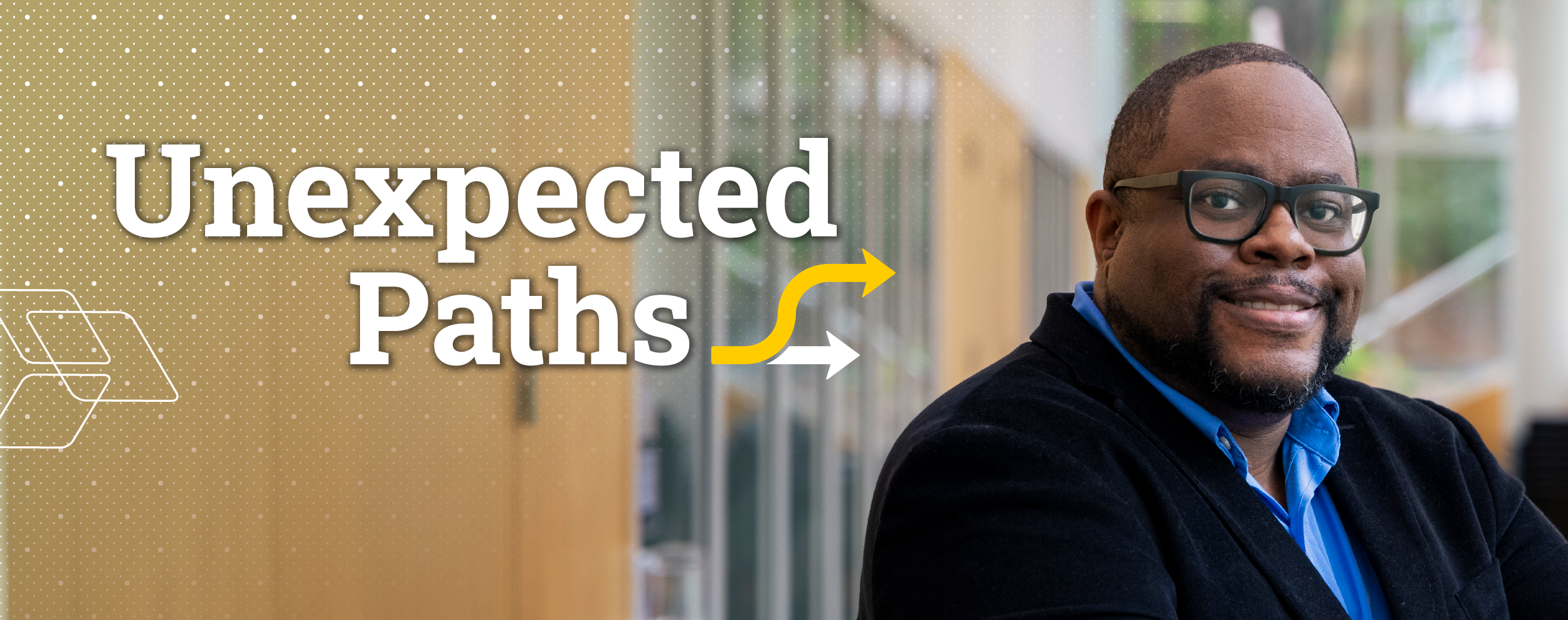Spidey Sense: How a Triple Jacket Makes Microelectronics Matter
Mikkel Thomas fell into microelectronics — and fell in love with it. Now, he’s leading more people to the field.
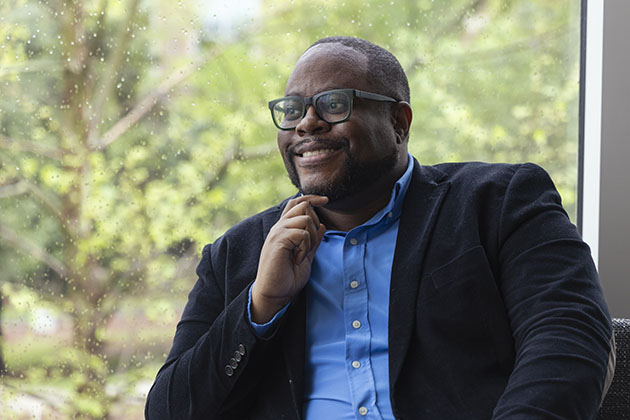
Mikkel Thomas is the associate director for education and outreach and a senior research engineer at the Institute for Matter and Systems.
Mikkel Thomas has loved comic books since he was a kid, but he didn’t expect to relate to them as an adult. Just like Peter Parker didn’t intend to be a superhero, Thomas didn’t plan to be a research engineer. When he came to Georgia Tech in 1993 as an undergraduate, a bit of serendipity led him to the field of microelectronics (very small electronic components and circuits). Three decades later, his superpower is demystifying the world of microelectronics for students.
“Many people hear the word ‘microelectronics’ and immediately think of computer chips, and stop there, but they’re so much more pervasive,” Thomas said. “They’ve become so ubiquitous we don't even realize we use them in everything from smartphones to nano-scrubbers in toothpaste. If you brushed your teeth this morning, you used nanotechnology.”
“If I ask kids what is nanotechnology, the most common answer is that Iron Man’s suit is nanotech. But if you're learning about nanotechnology from Tony Stark, you miss that there’s nanotechnology we use every day.”
Meeting Microelectronics
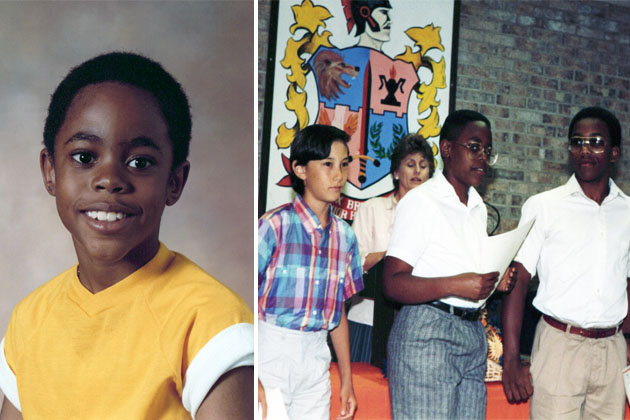
Thomas, pictured (left) in second grade, was always good at math and science in school. He was on his school’s math team with Elliot Moore II (right of Thomas), now an ECE professor at Georgia Tech.
Microelectronics wasn’t his first choice for a major. As a high schooler in Fort Walton Beach, Florida, Thomas knew he was good at — and liked — math and science. Arriving at the Institute as an Air Force ROTC student, he wanted to study chemical engineering, but that degree was not sponsored by the ROTC program. Instead, he found electrical and computer engineering (ECE) and decided to stay even after he left ROTC. “I went along that path, and it still brought me back to chemistry when I worked in the cleanroom,” he said. “It all worked out in the end.”
Thomas found chemical engineering again after a friend suggested he apply for a summer microelectronics internship through Georgia Tech’s Sure Program (then called GT-SUPREEM). It turned out that his friend was mistaken about the program’s focus.
“I wrote all these impassioned things about microelectronics on my application and was accepted — only to find out it was not specifically a microelectronics program after all,” Thomas said.
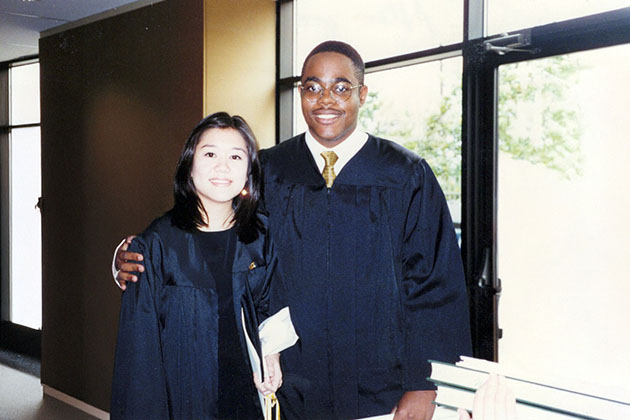
Thomas graduated from Georgia Tech in 1997 with a bachelor's degree in electrical and computer engineering.
Despite this, Thomas ended up working with microelectronics expert and Professor Nan Jokerst (now at Duke). Through this collaboration, he realized he was as passionate about microelectronics as he had written in his application.
The internship changed his entire academic career. He worked for Jokerst until he graduated, then formally joined her lab during his ECE master’s and Ph.D. studies. While the team camaraderie interested him in the lab, the work itself kept him there. Thomas primarily made lasers for chemical and biological sensors.
“I still ended up doing bioengineering — just more with a microelectronics flare,” Thomas noted. “No matter what you're interested in, microelectronics connects to everything.”
Educating the Next Generation
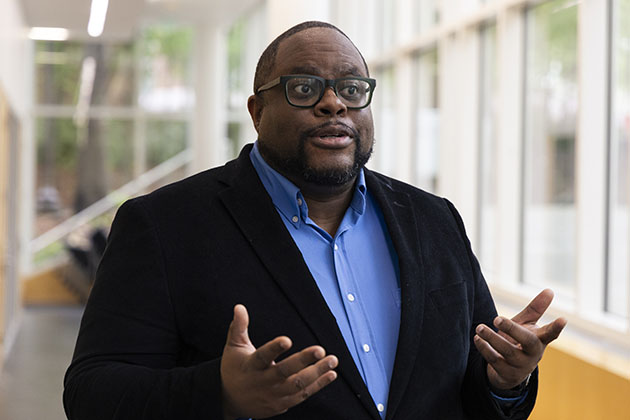
Thomas’ work at Georgia Tech makes the world of microelectronics more accessible to students.
As Thomas spent more time in the lab, he noticed that other students often approached him in the cleanroom, a contamination-free, bio-related fabrication and manufacturing environment. They often asked for help with how to run experiments on the lab equipment. Since he didn’t teach, he found the requests odd, but he tried his best to answer questions. One day, a student asked him about silicon, a material Thomas didn’t work with. Stumped, he talked to the cleanroom manager, Gary Spinner.
“I don't know why this guy thought I would know anything about silicon connections,’” Thomas recalled saying. “Then Gary said, ‘Oh, for the last two months, we've been telling anyone who has processing questions they should ask you because you know so much about it.’” Thomas had gained the respect of his supervisors, making him the go-to person for microelectronic development questions across the cleanroom.
Despite his affinity for explaining microelectronics research, Thomas wasn’t interested in teaching after finishing his Ph.D. and took a job building lasers for a Nevada-based company. Soon, leadership at Tech’s interdisciplinary research institute that runs the campus cleanroom, the Institute for Matter and Systems (IMS), gave him a call. They wanted to offer him a job.
Working with students is what keeps Thomas engaged. He’s happiest when someone comes up to him in the cleanroom and asks how to run the equipment or do an experiment — or even his thoughts on the latest Spider-Man movie.
IMS needed a process engineer to help graduate students in the lab, and Thomas was a natural choice after informally working as one as a graduate student. He interviewed, received the offer, and returned to Tech.
“The job appealed to me because I love problem-solving. When the grad students had issues, my job would be to fix them.”
Thomas would also have the opportunity to conduct his own research and learn about new fields. Initially, he loved the work, but as his role increasingly involved interacting with industry, he realized he missed the educational side. When the IMS associate director of education outreach left, she recommended Thomas for the role.
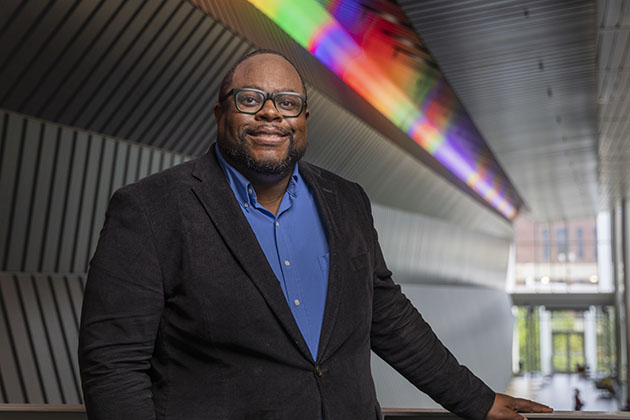
Thomas's work with IMS offers educational programming for all ages, from "K to gray," ensuring everyone has the opportunity to learn about the fascinating world of microelectronics.
IMS offers education and outreach from “K to gray,” so every age and skill level has a chance to learn how universal — and cool — microelectronics are. Seeking to engage students at a young age, IMS mostly works with middle school students. Schools are invited to visit IMS’s cleanroom, and IMS personnel also visit the students’ campuses. For students who can’t visit in person, they receive activity kits and a virtual talk. Through a summer workshop, IMS trains middle and high school teachers to bring microelectronics to their classrooms.
“If I ask kids what nanotechnology is, the most common answer is that Iron Man’s suit is nanotech,” Thomas said. “But if you're learning about nanotechnology from Tony Stark, you miss that there’s nanotechnology we use every day.”
At the college level, undergraduates from across the country can participate in summer internships in the cleanroom. This program is part of the National Science Foundation’s Research Experience for Undergraduates, and the goal is for students to see microelectronics as the spark for a whole new career path. Thomas also wants people to discover microelectronics before they get to college so they don’t repeat his experience of getting halfway through their undergraduate studies before learning microelectronics is the right field for them.
Working with students is what keeps Thomas engaged. He’s happiest when someone comes up to him in the cleanroom and asks how to run the equipment or do an experiment — or even his thoughts on the latest Spider-Man movie.
“What makes me proudest isn’t the research I’ve done, but that I worked with these students who had no interest in this field, but then they all found jobs in it after they left Georgia Tech,” Thomas said. “I like to think they are much more successful than I am now.”

Writer and Media Contact: Tess Malone, Senior Research Writer/Editor, Research Communications | tess.malone@gatech.edu
Video: Christopher McKenney, Video Producer, Research Creative Services
Photos: Christopher McKenney and courtesy of Mikkel Thomas
Series Design: Daniel Mableton, Senior Graphic Designer, Research Creative Services
Institute for Matter and Systems
The Institute for Matter and Systems (IMS) is one of Georgia Tech’s Interdisciplinary Research Institutes. IMS leverages Georgia Tech’s researchers, state-of-the-art facilities, and world-class educational programs to facilitate the creation of tomorrow’s systems and their enabling components.
IMS inspires the next generation and equips the workforce with the skills needed to collaborate and communicate across disciplines through outreach programs such as the National Science Foundation-funded Research Experience for Undergraduates and Research Experience for Teachers, K-12 educational experiences, STEAM events like the Atlanta Science Festival, and courses for adult learners.
Learn More
To explore careers in research, visit the Georgia Tech Careers website. To learn more about life as a research scientist at Georgia Tech, visit our guide to Research Resources or explore the Prospective Faculty hub on the Office of the Vice Provost for Faculty website.

